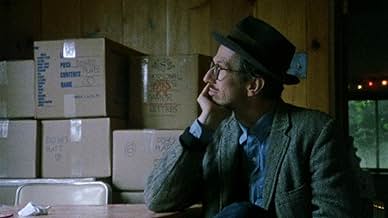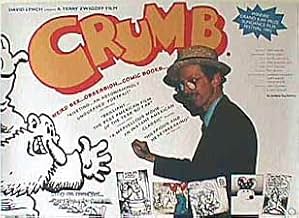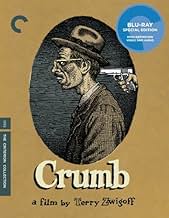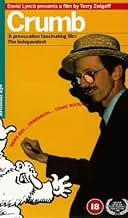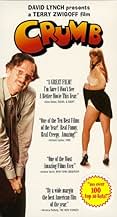Um retrato íntimo do controverso cartunista Robert Crumb e sua família traumatizada.Um retrato íntimo do controverso cartunista Robert Crumb e sua família traumatizada.Um retrato íntimo do controverso cartunista Robert Crumb e sua família traumatizada.
- Prêmios
- 18 vitórias e 6 indicações no total
- Self
- (as Aline Crumb)
- Self
- (as Dana Crumb)
Avaliações em destaque
To many, this documentary may be depressing, offensive to women, or just too damn ugly to sit through, but it made me as happy as anything I've ever seen on screen. Art's ability to reveal truth and promote survival is evident in every frame. I admire R. Crumb's courage to speak unpopular truths, to draw what gets him off, and to ferret out the art he loves at considerable expense and trouble (he's a blues maven; one of my favorite scenes, where's he's sitting on his floor absorbed by aching music, is echoed in Ghost World, when Enid takes home Seymour's record and gets lost in her favorite song). And like Ghost World, ratty, real American culture is railed at hilariously: another favorite scene involves R. on a park bench, disgustedly commenting on the ugliness of everything around him: logo-emblazoned clothes, graceless music, ugly plastic everything.
By the end of it all, I respected and liked him Crumb enormously. I'd take his scary-woman worship over the banal musings of a dime-store philosopher any day. And Terry Zwigoff deserves much praise for being able to pull it off (especially as a first-time filmmaker who had very little idea what he was doing). From high art and family pathos to a lovely animal appreciation of big round female asses, this is far more a "roller-coaster, I laughed/I cried" film than most others so touted.
I have been a fan of Crumb ever since I advanced beyond Donald Duck and Marvel Comics about 20 years ago (this is not to say that I don't love Donald or Marvel anymore, because I do). Crumb is probably the most talented comic book artist of the latter half of the 20t Century. Quite simply, I don't think anyone can draw as well as he does. He is not much of a storyteller, but like I pointed out above, that is more than made up by the fact that he is always totally candid about his life, sometimes painfully and embarrassingly so.
"Crumb" is an excellent portrait of an exceptionally talented artist who also happens to be a total pervert. However, as this film makes abundantly clear, Robert Crumb is practically the ideal model of a stable, well-adjusted person when compared to his mother or his brothers Charles and Maxon. We see once again that great suffering makes a great artist.
Everyone seems to come away from the movie with an idea that Robert is spared the obvious insanity of his two brothers because of his art. But I see it differently(hence the title of this comment). Even Robert admits that his brother, Charles, was a better cartoonist. Another way to view Robert's "success" and his brothers' descent into "crazy" is fame. Crumb was an involuntary icon of the 60's. Where would Robert be today if he wasn't recognized and rewarded in the 60's? If Zap comix had turned him away for his misogynist and racist comics, would he have had the subsequent female relationships that seemed to normalize his existence? What would his fantasizing over a high school yearbook and habitual masturbation meant if he was an unknown sharing a room with his brother at Mom's house?
When I watch this movie, I am always mindful that Robert's obvious genius would be lost were it not for his luck at being discovered. I suppose that is an obvious statement but, in Crumb's case, fame has managed to gloss over many unacceptable characteristics. And, maybe, that's not such a bad thing.
The film lightly touches on Crumb's relationship with his son and daughter. For some reason, Crumb's bumbling attempts at affection with his children were a bit disturbing. Or maybe its just that Crumb's fixation with wrestling and piggyback riding lingers in your mind when he hugs his daughter.
On a lighter note, I've noticed that no one has mentioned the soundtrack of this movie. Designed to be in keeping with Robert's love of old American music, the music helps to define the subject. I wonder why Zwigoff made no mention of Crumb's Cheap Suit Serenaders band.
Crumb comments against the crass commercialism of America. And, yet, I first saw this movie at a theater in Baltimore where the lobby was chock full of Crumb comic picture cards, mugs, etc.
Crumb, the movie, is a crazy world of contradictions and well worth the ride.
Você sabia?
- CuriosidadesWhen he was trying to raise funds for the film, Terry Zwigoff encountered Terry Gilliam whom he knew had worked with Robert Crumb in the late 60s. Approaching Gilliam, Zwigoff asked for some help with the budget. Gilliam reached into his pocket, handed over a nickel and then walked away.
- Erros de gravação"San Francisco" is misspelled in the closing titles. The caption reads: "Max Crumb still lives in San Francicsco".
- Citações
Robert Crumb: Jesus. Fuckin' raging, epithet music comin' out of every car, every store, every person's head. They don't have noisy radios on, they got earphones; like, "motherfuckin', cocksuckin', son of a bitch. Lot of aggression. Lot of anger, lot of rage. Everybody walks around, they're walkin' advertisements. They've got advertisements on their clothes, you know? Walking around with "Adidas" written across their chests, '49'ers on their hats. Jesus. It's pathetic. It's pitiful. The whole cultures' one unified field of bought-sold-market researched everything, you know. It used to be that people fermented their own culture, you know? It took hundreds of years, and it evolved over time. And that's gone in America. People now don't even have any concept that there ever was a culture outside of this thing that's created to make money. Whatever's the biggest, latest thing, they're into it. You just get disgusted after a while with humanity for not having more, kind of like, intellectual curiosity about what's behind all this jive bullshit.
Principais escolhas
- How long is Crumb?Fornecido pela Alexa
Detalhes
- Data de lançamento
- País de origem
- Central de atendimento oficial
- Idioma
- Também conhecido como
- Крамб
- Locações de filme
- Empresa de produção
- Consulte mais créditos da empresa na IMDbPro
Bilheteria
- Faturamento bruto nos EUA e Canadá
- US$ 3.041.083
- Fim de semana de estreia nos EUA e Canadá
- US$ 19.859
- 23 de abr. de 1995
- Faturamento bruto mundial
- US$ 3.041.083
Contribua para esta página



